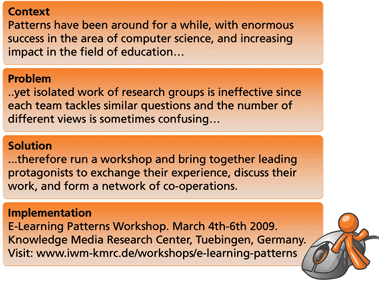
Home
| Call for Abstracts | Registration
| Program Computer
assisted assessment patterns for different target users: the
case of Multimedia Questionnaires
PATRICIA SANTOS,
DAVINIA HERNÁNDEZ-LEO,
TONI NAVARRETE,
JOSEP BLAT
Universitat Pompeu Fabra, Barcelona, Spain
In eLearning a large
diversity of patterns are proposed for different types of target users
(e.g. teachers, developers, etc.), although in some cases these potential
users are not clearly defined. Our context of study is focused on Computer
Assisted Assessment (CAA) processes. Within the large number of methods
to assess learning, we study the use of eQuestionnaires that make use
of technical assessment specifications such as IMS Question and Test
Interoperability (QTI). We analyse how the design, creation and use
of an eQuestionnaire in a CAA process is structured in stages where
different users are involved. These users have to solve a problem in
order to enable the next stage. According with a user and his/her problem,
a specific good technique can be applied. This information can be organized
in a pattern. We propose a collection of patterns for different target
users who work in the integration of new opportunities on CAA using
Web 2.0 services in an eQuestionnaire. This collection is composed by:
one pattern for teachers which introduces the
benefits of using eQuestionnaires with Web2.0 interactions; a second
pattern for CAA designers which presents how to create a model of new
types of interaction without extending the assessment specification;
and finally a third pattern for developers which solves the problem
of how to implement a tool with Multimedia Web 2.0 Interactions using
an assessment specification to design eQuestionnaires. Each pattern
belongs to different pattern languages, however they are complementary
and dependent among them.We have done a survey study to identify if
the use of patterns can improve the tasks and relations among users
in a CAA process. The evaluation results indicate that users recognize
the potential use of patterns useful for facilitating the sharing of
good practices.
Back
to program schedule
|

|

